I got an email from Jenn, headline subject “Discouraged” and what she wrote to ask me about echoes what I hear from many people right around the first week or two of following a program.
Hi Bree,
I’m doing your 30 day challenge and I bought your meal plan as well. I was on a very unhealthy path of eating crap every day and feeling awful, like I was waiting to have a heart attack or something.
I have 2 little ones so I knew I had to snap out of it. I have been doing so awesome sticking to the food and getting in every work out.
I had great results last week. Down 5lbs and 6.4 inches. This week I was a tad discouraged with my results I stuck to the meal plans and work outs….Is it normal for results (weight) to slow down like this right away? Am I eating too little or not enough?
Hopefully chat soon.
Jenn
First, let’s celebrate how well Jenn is doing.
She made a MAJOR difference during her first week swapping out unhealthy processed foods for healthy, whole foods. She’s stuck to a consistent exercise plan. But she’s now feeling discouraged because she didn’t see an additional 6.4 inch decrease in the next 7 days and another 5lb drop in weight.
So let’s talk about our weight, and how it’s not the same thing as our body composition…
Due to over-focus on “weight loss” many women are more focused on seeing a scale number go down rather than on how they can lose body fat and increase lean mass (muscle tissue).
“Weight” by itself is a poor indicator of body composition. Weight on the scale measures overall body weight, which includes muscle, bone, water at the time of weighing, body fat and all the body tissues combined.
Because many of these factors are variable (have you eaten, how much water are you retaining, what time of the month is it, have you had a bowel movement today), it’s more ideal to measure the composition of fat and muscle tissue on the body rather than body weight alone, which does not take the ratio of these important tissues into consideration.
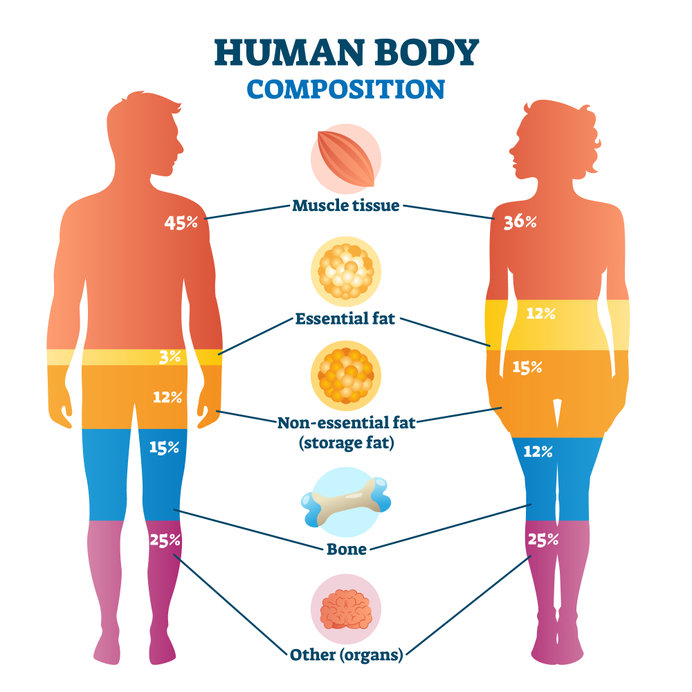
Muscle and fat are very different in your body. A pound of fat and a pound of muscle weigh exactly the same thing, but they take up very different amounts of space in your body.
Muscle is denser and more compact than fat, and takes up less space. Fat takes up more space and is looser. If you gained a pound of muscle, your body would look different than if you gained a pound of fat.
Two women, one with more muscle and less fat and one with more fat and less muscle might weigh the exact same number on the scale. But the woman with more muscle will look leaner and more compact, and the woman with more body fat will look thicker.
While a pound of muscle and a pound of fat both weigh one pound, the pound of fat takes up more space than the pound of muscle, due to its structural composition.
This is why taking a closer look at the ratio of muscle to fat on your body matters far more than the “amount you weigh.”
In the picture below, Susan shared how her weight went up and her size went down. Below her examples, you can see 5 lbs of muscle and 5 lbs of fat on a scale – they both weigh 5 lbs, but the pound of muscle takes up less space than the fat. The same thing happens in your body.

Looking stronger and more compact is what a lot of people are after but may not understand that the scale weight alone isn’t going to show you these body composition details and changes, and that our expectation of how fast this is all going to happen may need a little adjustment.
When you change your eating to one with a greater focus on whole foods and start prioritizing protein, you’ll initially lose some fat your body was holding onto from inflammation created from the junk in you used to eat more regularly, and after that initial drop, you’ll experience a more gradual weight reduction over the coming weeks if you stick to a healthy eating plan.
If you add exercise regularly like Jen did, your results will also include shifts in your body composition to more lean muscle, which means that as you lose body fat and gain muscle your body will reflect that look on the outside – you’ll become more compact.
This doesn’t necessarily translate to “you’ll weigh a lot less all at once” though. For instance, check out Sofia’s post about how she looks different (leaner) but weighs more (the #RAB she’s referring to is the “Rockin Abs and Booty” challenge, one of the many challenges in Rock Your Life, which she is a member of).
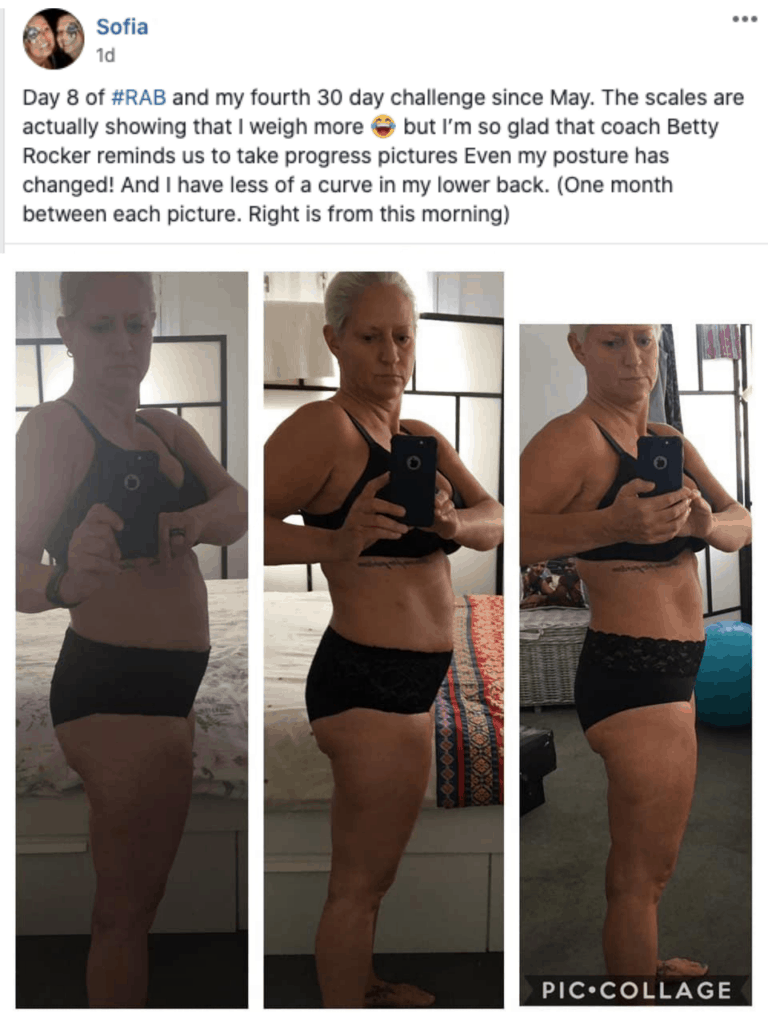
To get a real body composition measurement, ideally you would use a professional method like the DXA scan (dual x ray absorptiometry), air displacement plethysmography (i.e “Bod pod“), bioelectrical impedance measurement (i.e. InBody scan or similar), 3-D body scanner, or other professional body composition measuring test.
However as these are not always readily available, other methods may be useful for self testing, including skin caliper measurements, measurements with a tape measure around the hips, thighs, arms, stomach and chest, and full length photos from the front, side and back wearing the same or similar garments.
While it’s absolutely fine to weigh yourself in addition to these methods when looking for changes, only weighing yourself will give you very little data that speaks to your body composition. Combined with an over focus on “weight loss” along with the cultural expectations of women and their bodies, many women have disordered eating, disordered self perception, and are following fad diets, skipping meals, under-eating and overtraining.
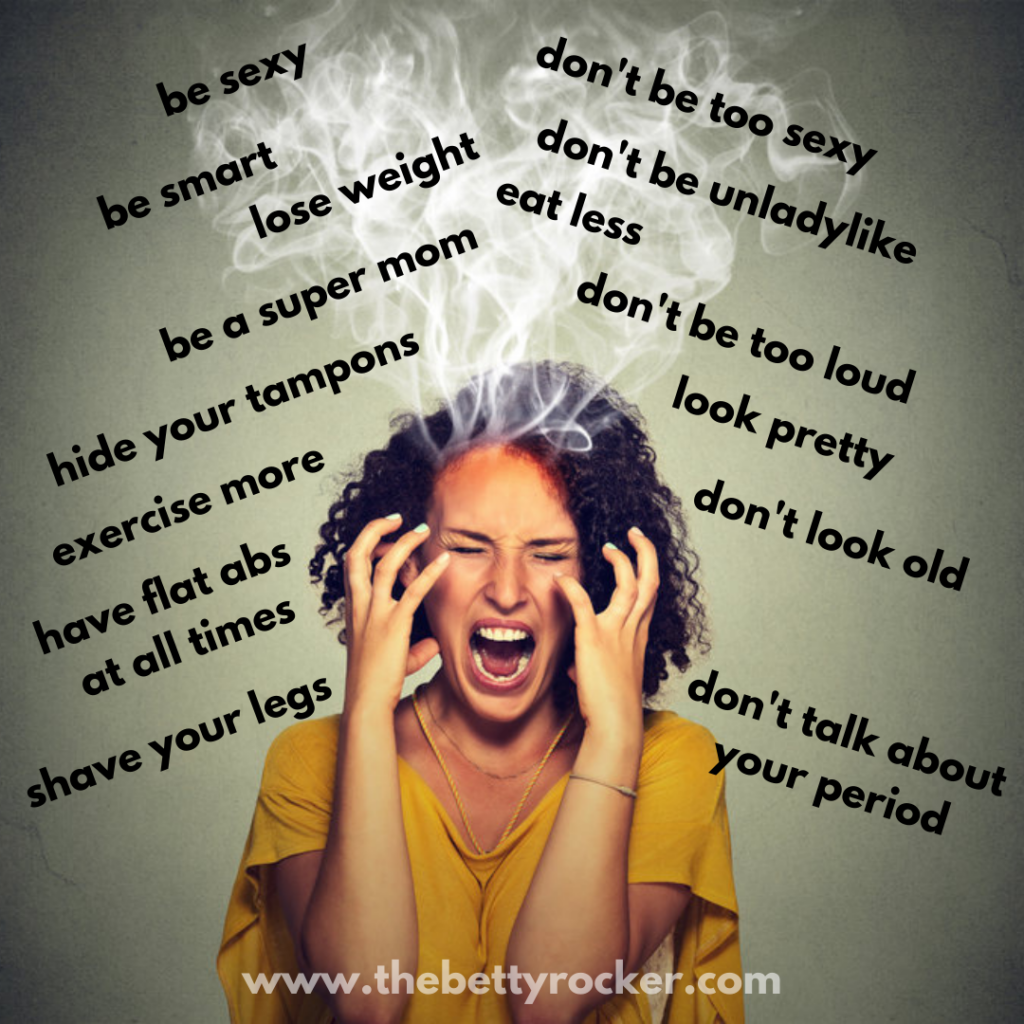
They end up constantly down on themselves for their perceived lack of progress, under nourished, stressed-out and set themselves up for unintended health consequences including an increased risk for bone stress injury and cardiovascular disease.
This heightened stress state from overtraining and under fueling (not to mention stressing about our weight and every other pressure we feel from societal expectations) elevates our cortisol and increases the inflammatory response, which not only breaks down muscle but also creates fat storage and has a detrimental impact on our mood, energy levels, and long-term metabolic rate and overall health.
While some “weight loss” may be observed, this often comes back quickly, and the manner in which the weight is lost has unintended consequences that do little to contribute to a highly functional, strong body. All this focus on our weight and the vicious cycle we get in when we constantly seek shortcuts to lose it can undermine our long-term health and a good quality of life, increase negative self talk, and contribute to the perception that our appearance is the main driver of our value and worth.
While fat loss is a goal that a lot of women have and equate to “weight loss,” not enough women have the goal of gaining or preserving muscle, and as a result they are losing out – especially during the important transition from regular menstruating years to peri and post menopause – a time when the body’s fluctuating estrogen and progesterone signals become irregular and eventually stop, impacting our ability to lose fat and build muscle the same way.
The reason I say we as women are losing out is because muscle is metabolic currency. When we focus on strengthening, growing and preserving our muscle tissue, we start training, eating and resting in smarter ways, ways that go beyond aesthetics and support our long-term health – and as an added bonus, frequently have an aesthetic result as a natural byproduct.
I discussed this in depth, along with the ramifications this has on women in a recent podcast with Dr. Stacy Sims, and Rock Your Life member Amanda had this to say about how it impacted her:
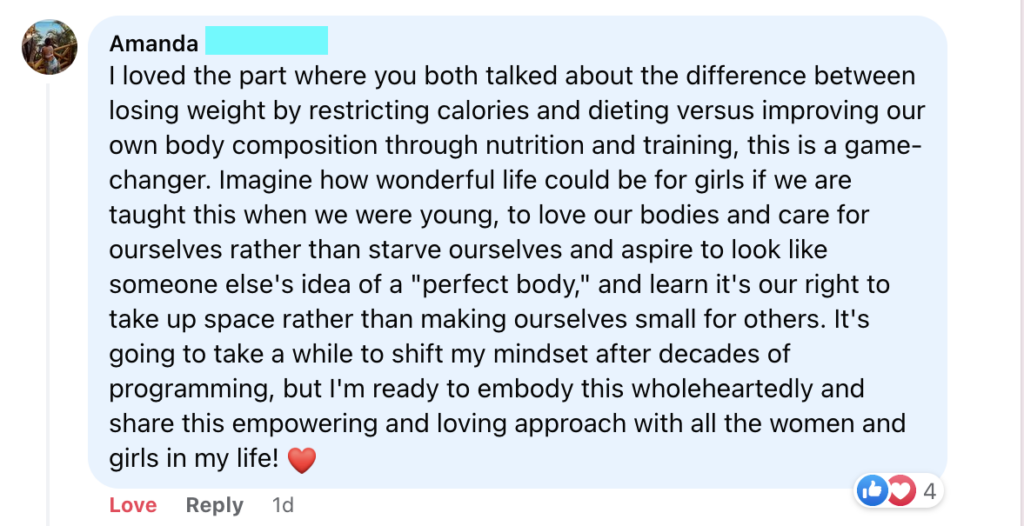
Understanding body composition and setting goals with that as a primary focus rather than on weight loss is truly a mindset game changer.
As Amanda points out, this unhealthy focus on having someone else’s idea of a “perfect body” is one of the root causes of the problem that creates so much stress and pressure on women.
Focusing on muscle, and training strategies to grow it will not necessarily “bulk you up.” Here is a great example from Meg, another Rock Your Life member. We can clearly read about and see how she has shifted her body composition to be more muscular, and broken up with her scale at last. Her weight increase and size decrease shows that she has put on some solid muscular strength which made her smaller, not larger or bulkier.
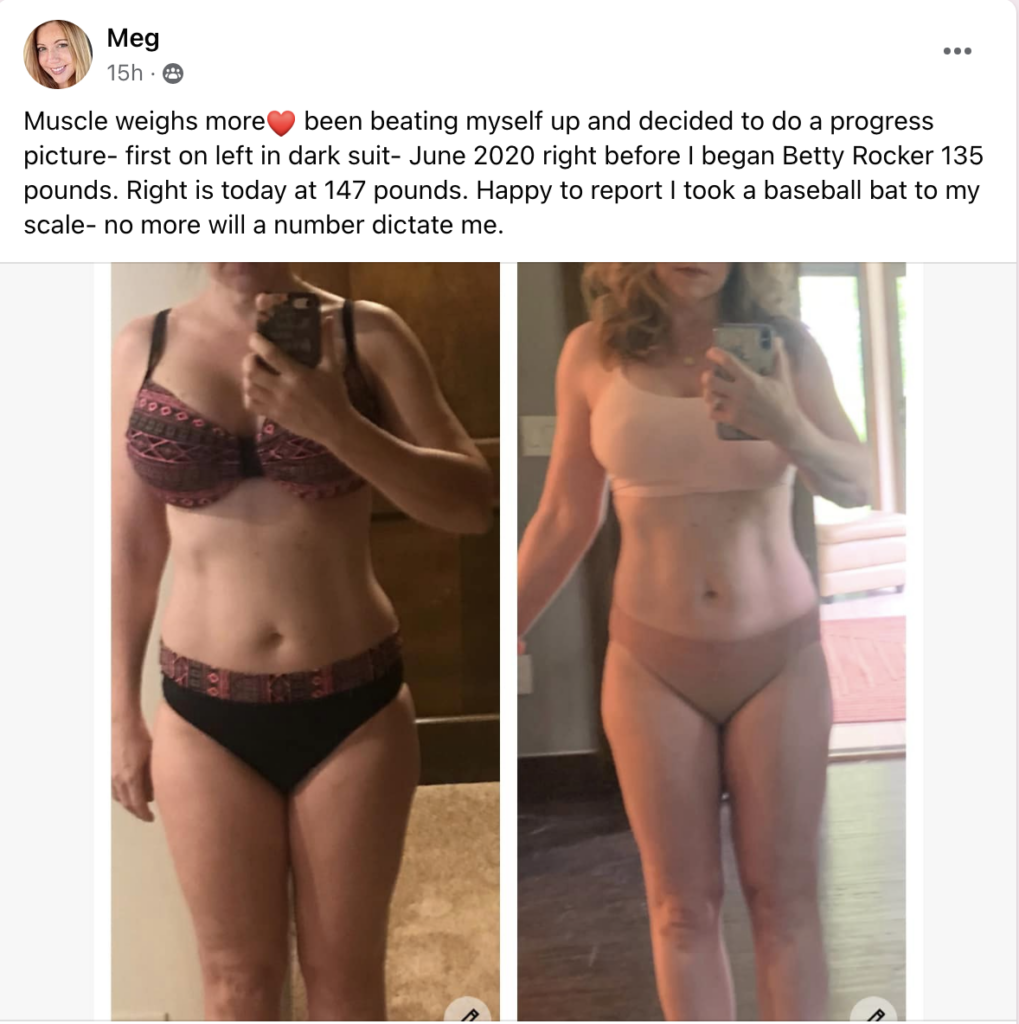
You can add muscle to your body and focus on fueling for it without concern that you will become a bodybuilder. Professional female body builders work very hard to build up their muscle tissue to the level you see in competitions, and gaining muscle at that level is challenging due to the differences in amount of testosterone in men and women.
If getting huge biceps is not an aesthetic goal for you, have no fear that you’re going to suddenly achieve it. But it is attainable for you if you choose to pursue it – I recommend a personal trainer who specializes in body building if this is of interest, and a willingness to spend years in pursuit of that goal.
Some common mistakes I see people make are the following:
- Getting discouraged because they feel they aren’t losing enough weight
- Getting discouraged because they are comparing their body and speed of result to other people’s – who they don’t actually know the health history, full story, metabolic health, etc).
- Switching programs after a week or two because they don’t think they’re getting fast enough results which often causes an adverse physiological response and can increase weight gain as there is often a lag period in which the individual gives up before starting over – known as the bottom of the roller coaster.
- Getting stressed about the expected results and how fast they’re going to happen causes stress hormones to rise, which promotes storage of more belly fat, decreases our ability to get good rest (another way to pack on more fat), and decreases quality of life and life enjoyment.
So….if this is you, or has ever been you, what I want you to know is that YOUR body is on its own schedule. It’s changing.
Every choice you make creates a chain reaction that reverberates throughout your cells, organs, tissues and brain.
Remember that you may be dealing with a fatigued system, a system that has been inflamed for a while, a system with some hormone imbalances, a lowered resting metabolic rate or hormone imbalance from too much sugar or other health concerns.
You can’t expect it to bounce back overnight.
That’s why it’s important to pace yourself. Shift your focus to how you can nourish your body and support your energy output, rather than seeing food as something you need to eat less of to be smaller.
No matter what program you follow, there is NO “one size fits all” amount of food. Your needs are going to change daily.
If you’re eating whole foods and following one of my eating programs for optimizing your intake of the RIGHT nutrients, you absolutely cannot get this wrong.
But you’re not going to drop 20 pounds in a week. You didn’t GAIN 20 pounds in a week, right?
Love your body along the way as it does its thing, and continue to support yourself along the way. To see the best result on the outside, get engaged with what you’re putting INSIDE your body.
You don’t have to become a nutritionist to do this right, either. You also don’t need to try every fad diet out there, count every calorie, track every bite of your food, or eliminate everything you like every day. It’s all about balance, and understanding the nutrients that make up the foods you eat, which is exactly what I teach you in my meal plans, and give you healthy, balanced recipes so you can put that into practice.
For the best results, combine your healthy eating with fitness….and if you don’t see your weight drop rapidly but you’re taking your progress pics you WILL see your body start to change. Look for those signs.
Interested in more about women’s health, body composition, training with your cycle and training in peri and post menopause?
Read: Shifting the Muscle to Fat Ratio: Women-Specific Body Composition Considerations
Check out the Women’s Health Section of this blog!
Listen: to The Betty Rocker Show podcast!
Have a story to share or a comment to add? I love hearing from you. Join the discussion below!
